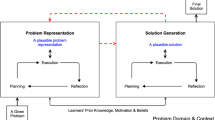Abstract
The Purpose of this study was to examine effectsof group discussion of a medical problem on the comprehension of a subsequentproblem-relevant text by first year medical students.
Forty-eight first-year medical students were randomly assigned toone of two conditions: The experimental group discussed a problem of blood pressureregulation, where the control group discussed a problem of vision. Subsequently, allstudents studied a text on the physiology of blood pressure regulation. Finally, a freerecall test was administered. Numbers of propositions accurately recalled were analyzed usinganalysis of variance (ANOVA). Students who discussed the blood pressure regulationproblem recalled 25% more from the text than those who discussed the control problem.This difference was statistically significant. The present study represented thefirst truly randomized trial in the ecologically valid context of a medical curriculum. Itdemonstrated the positive effects of problem-based tutorial group discussion on thecomprehension of text. It confirmed earlier findings from laboratory studies thatproblem-based learning, in addition to positive emotional and motivational long-term effectswell-documented in the literature, also has positive effects on learning.
Similar content being viewed by others
References
Albanese, M.A. & Mitchell, S. (1993). Problem-based learning: A review of literature on its outcomes and implementation issues. Academic Medicine 68(1): 52–81.
Bernards, J.A. & Bouman, L.N. (1988). Fysiologie van de mens (5 edn.). Houten: Bohn Stafleu Van Loghum.
Berne, R.M. & Levy, M.N. (1992). Cardiovascular Physiology (6 edn.). St Louis: Mosby.
Bielaczyc, K., Pirolli, P.L., & Brown, A.L. (1995). Training in self-explanation and selfregulation strategies: Investigating the effects of knowledge acquisition activities on problem solving. Cognition and Instruction 13(2): 221–252.
Chi, M.T.H., Bassok, M., Lewis, M.W., Reimann, P. & Glaser, R. (1989). Self-explanations: How students study and use examples in learning to solve problems. Cognitive Science 13: 145–182.
De Volder, M.L., Schmidt, H,G., De Grave, W.S. & Moust, J.H.C. (1989). Motivation and achievement in cooperative learning: the role of prior knowledge. In J.H.C. van der Berchen & F. Halisch, eds, Achievement and Task motivation. Berwyn: Swets North America.
Eisenstaedt, R.S., Barry, W.E. & Glanz, K. (1990). Problem based learning: Cognitive retention and cohort traits of randomly selected participants and decliners. Academic Medicine 65 (Supp): S11.
Guyton, A.C. (1991). Medical Physiology (8 edn.). Philadelphia: Saunders.
Hamilton, R. (1989). The effects of learner-generated elaborations on concept learning from prose. Journal of Experimental Education 205–216.
Kalaian, H.A., Mullan, P.B. & Kasim, R.A. (1998). Hierarchical linear modeling of the effects of problem-based learning on medical students' performance on NBME I and NBME II: A meta-analytic perspective. Paper presented at the Annual Meeting of the American Educational Research Association. San Diego, CA, April 13–17.
King A. (1992). Facilitating elaborative learning through guided student-generated questioning. Educational Psychologist 27(1): 111–126.
Martensen, D., Eriksson, H. & Ingelman-Sundberg, M. (1985). Medical chemistry: Evaluation of active and problem-oriented teaching methods. Medical Education 19: 34–42.
Mayer, R.E. (1989). Models for understanding. Review of Educational Research 59(1): 43–64.
Mayer, R.E. (1996). Learning strategies for making sense out of expository text: The SOI model for guiding three cognitive processes in knowledge construction. Educational Psychology Review 8(4): 357–371.
Prawat, R. (1989). Promoting access to knowledge, strategy and disposition in students: A research synthesis. Review of Educational Research 59(1): 1–41.
Pressley, M., Wood, E., Woloshyn, V.E., Martion, V., King, A. & Menke, D. (1992). Encouraging mindful use of prior knowledge: Attempting to construct explanatory answers facilitates learning. Educational Psychologist 27(1): 91–109.
Reynolds, R.E. (1992). Selective attention and prose learning: Theoretical and empirical research. Educational Psychology Review 4(4): 345–391.
Schmidt, H.G. (1982). Activatie van voorkennis, intrinsieke motivatie en de verwerking van Tekst. (Activation of prior knowledge, intrinsic motivation and comprehension of text). PhD-thesis, Apeldoorn: Van Walraven.
Schmidt, H,G. (1993). Foundations of problem based learning: Some explanatory notes. Medical Education 27: 422–432.
Schmidt, H.G., De Volder, M.L., De Grave, W.S., Moust, J.H.C. & Patel, V.L. (1989). Explanatory models in the processing of science text: The role of prior knowledge activation through small-group discussion. Journal of Educational Psychology 81: 610–619.
Tans, R.W., Schmidt, H.G., Schade-Hoogeveen, B.E.J.& Gijselaers, W.H. (1986). Sturing van het onderwijsleerproces door middel van problemen: een veld experiment (Directing the learning process by means of problems: A field experiment). Tijdschrift voor Onderwijsresearch 11: 35–46.
Van den Broek, P., Fletcher, C.R. & Risden, K. (1993). Investigations of inferential processes in reading: A theoretical and methodological integration. Discourse Processes 16: 169–180.
Webb, N.M. & Sullivan-Palincsar, A. (1996). Group processes in the classroom. In D.C. Berliner & R.C. Calfee, eds, Handbook of Educational Psychology, pp. 841–873. New York: Simon & Schuster Macmillan.
Author information
Authors and Affiliations
Rights and permissions
About this article
Cite this article
de Grave, W.S., Schmidt, H.G. & Boshuizen, H.P. Effects of problem-based discussion on studying a subsequent text: A randomized trial among first year medical students. Instructional Science 29, 33–44 (2001). https://doi.org/10.1023/A:1026571615672
Issue Date:
DOI: https://doi.org/10.1023/A:1026571615672




